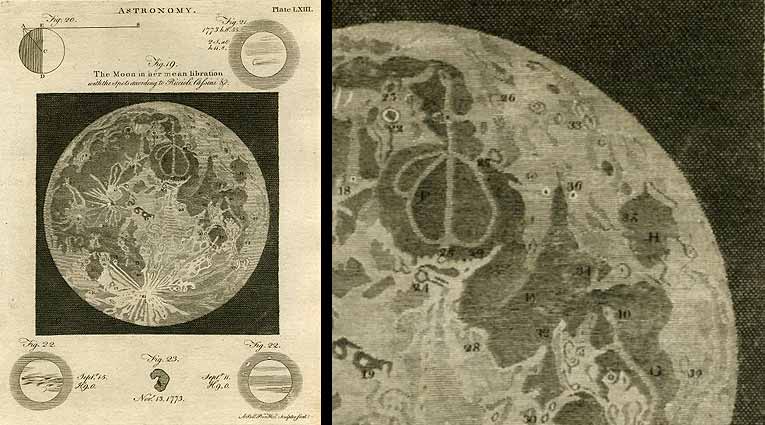Difference between revisions of "October 28, 2014"
| Line 5: | Line 5: | ||
<em>image by permission of Ian at Aquatint</em><br /> | <em>image by permission of Ian at Aquatint</em><br /> | ||
<br /> | <br /> | ||
| − | The Encyclopedia Britannica has been the undisputed leader of English-language encyclopedias since it first appeared in 1768. Its articles were and are authoritative and often exhaustive. Thus, this engraving from the 1797 edition should be expected to show the Moon as it was currently known. But like the 1826 lunar map of an earlier LPOD, this map harkens back to the 1600s for its inspiration. The author claims no more, for the chart is labeled, <em>The Moon in her mean libration, with the Spots according to Riccioli, Cassini & c.</em> The overall positioning and depiction of features is derived from Grimaldi's map (which Riccioli supplied names to), and the Greek letter phi in Serenitatis is characteristic of Cassini's full Moon [http://brunelleschi.imss.fi.it/galileopalazzostrozzi/object/GiandomenicoCassiniLargeMapOfTheMoon.html | + | The Encyclopedia Britannica has been the undisputed leader of English-language encyclopedias since it first appeared in 1768. Its articles were and are authoritative and often exhaustive. Thus, this engraving from the 1797 edition should be expected to show the Moon as it was currently known. But like the 1826 lunar map of an earlier LPOD, this map harkens back to the 1600s for its inspiration. The author claims no more, for the chart is labeled, <em>The Moon in her mean libration, with the Spots according to Riccioli, Cassini & c.</em> The overall positioning and depiction of features is derived from Grimaldi's map (which Riccioli supplied names to), and the Greek letter phi in Serenitatis is characteristic of Cassini's full Moon [http://brunelleschi.imss.fi.it/galileopalazzostrozzi/object/GiandomenicoCassiniLargeMapOfTheMoon.html map] of 1692. Somehow, the best lunar map produced by that time, Mayer's 1775 chart - the first based on measured positions - was unknown to Britannica's editors.<br /> |
<br /> | <br /> | ||
| − | <em>[mailto:tychocrater@yahoo.com | + | <em>[mailto:tychocrater@yahoo.com Chuck Wood]</em><br /> |
| − | <em>This is from [http://www.lpod.org/archive/LPOD-2004-10-28.htm | + | <em>This is from [http://www.lpod.org/archive/LPOD-2004-10-28.htm LPOD] 10 years ago today, when I was a mere lad.</em><br /> |
<br /> | <br /> | ||
<strong>Technical Details</strong><br /> | <strong>Technical Details</strong><br /> | ||
Revision as of 18:19, 11 January 2015
Britannic Moon

image by permission of Ian at Aquatint
The Encyclopedia Britannica has been the undisputed leader of English-language encyclopedias since it first appeared in 1768. Its articles were and are authoritative and often exhaustive. Thus, this engraving from the 1797 edition should be expected to show the Moon as it was currently known. But like the 1826 lunar map of an earlier LPOD, this map harkens back to the 1600s for its inspiration. The author claims no more, for the chart is labeled, The Moon in her mean libration, with the Spots according to Riccioli, Cassini & c. The overall positioning and depiction of features is derived from Grimaldi's map (which Riccioli supplied names to), and the Greek letter phi in Serenitatis is characteristic of Cassini's full Moon map of 1692. Somehow, the best lunar map produced by that time, Mayer's 1775 chart - the first based on measured positions - was unknown to Britannica's editors.
Chuck Wood
This is from LPOD 10 years ago today, when I was a mere lad.
Technical Details
This map recently [IN 2004] sold on eBay for $222. I thank the seller, Ian of Acquatint, for permission to use it for LPOD.



